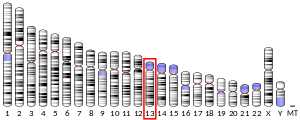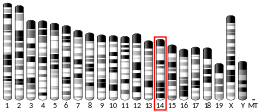Further reading
- Aromolaran KA, Benzow KA, Koob MD, Piedras-Rentería ES (2007). "The Kelch-like protein 1 modulates P/Q-type calcium current density". Neuroscience. 145 (3): 841–50. doi:10.1016/j.neuroscience.2006.12.046. PMID 17289272.
- Seng S, Avraham HK, Jiang S, et al. (2007). "KLHL1/MRP2 mediates neurite outgrowth in a glycogen synthase kinase 3beta-dependent manner". Mol. Cell. Biol. 26 (22): 8371–84. doi:10.1128/MCB.02167-05. PMC 1636797. PMID 16982692.
- Barrios-Rodiles M, Brown KR, Ozdamar B, et al. (2005). "High-throughput mapping of a dynamic signaling network in mammalian cells". Science. 307 (5715): 1621–5. doi:10.1126/science.1105776. PMID 15761153.
- Dunham A, Matthews LH, Burton J, et al. (2004). "The DNA sequence and analysis of human chromosome 13". Nature. 428 (6982): 522–8. doi:10.1038/nature02379. PMC 2665288. PMID 15057823.
- Ota T, Suzuki Y, Nishikawa T, et al. (2004). "Complete sequencing and characterization of 21,243 full-length human cDNAs". Nat. Genet. 36 (1): 40–5. doi:10.1038/ng1285. PMID 14702039.
- Strausberg RL, Feingold EA, Grouse LH, et al. (2003). "Generation and initial analysis of more than 15,000 full-length human and mouse cDNA sequences". Proc. Natl. Acad. Sci. U.S.A. 99 (26): 16899–903. doi:10.1073/pnas.242603899. PMC 139241. PMID 12477932.
- Nagase T, Kikuno R, Ishikawa K, et al. (2000). "Prediction of the coding sequences of unidentified human genes. XVII. The complete sequences of 100 new cDNA clones from brain which code for large proteins in vitro". DNA Res. 7 (2): 143–50. doi:10.1093/dnares/7.2.143. PMID 10819331.



